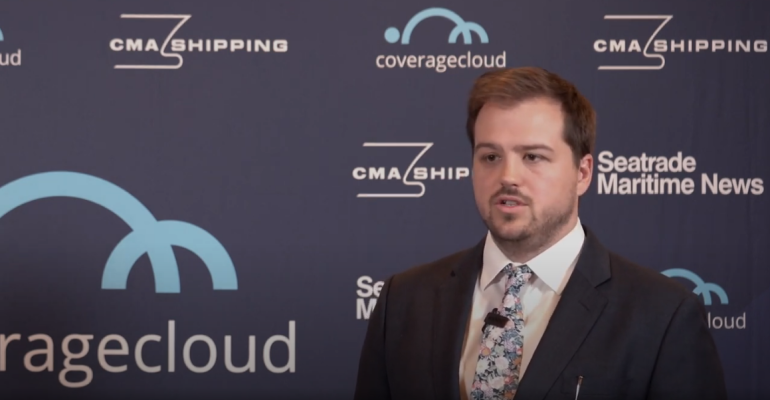A week on from its announcement that it raised US$34m in Series B funding, Seatrade Maritime News caught up with Ross Millard, Senior Director, Insights & Strategy, Nautilus Labs.
“It’s been a really exciting week,” said Ross. “We’re working on a really fascinating problem at Nautilus where shipping emits about 3% of total human greenhouse gas emissions and we think there’s an opportunity to reduce about 30% of that… so we’re talking about 1% of total greenhouse gas emissions.”
Nautilus Labs will use the funding to develop and deploy new product capabilities that support client goals to drive decarbonization while maximizing profits, attract fresh tech talent, and open and expand new offices in key shipping hubs worldwide.
Microsoft played a leading role, with M12, Microsoft’s venture fund, and the Microsoft Climate Innovation Fund co-investing for the first time. This round brings Nautilus’s total raised capital to over $48m.
Ross added: “The industry has been working on different solutions for a long time. And we’re really excited to see this kind of commitment from Microsoft Climate ventures, among other investors to really start to solve this problem, and provide a bit more ammunition and firepower as we push on to the next level of growth and development.”
Asked what the feedback from the industry has been since the announcement, Ross said:
“We’ve got really good feedback from the industry. I think that the shipping industry is excited that outside companies and particularly big known entities like Microsoft are taking this problem seriously and see real opportunity within the maritime space for us to start to solve this problem. And I think that there’s a tonen of optimism in the industry about what this kind of investment and can lead to in the future.
The announcement comes at a critical time for the industry. Shipping accounts for 3% of anthropogenic greenhouse gas emissions (GHG), approximately 1 gigaton of CO2 every year. If left unchecked, shipping will account for 17% of GHG by 2050. The sector’s inefficiency is rooted in legacy structures that impact the entire supply chain. Just-in-time arrival does not exist in ocean shipping in the same way it does in aviation; ships leave port at high speeds only to slow down prior to reaching their destination and waiting for berth availability. The net impact is damaging: fuel waste, excess emissions, lost capital for ship owners and charterers alike – and supply chain inefficiency for everyone. The International Maritime Organization (IMO) has set in place carbon intensity standards that commence in 2023, while the EU Emissions Trading Scheme (ETS) will also cover ocean commerce starting next year.
The Series B round also saw participation from new and existing investors, including NSS Advisers, Systemiq Capital, Root Ventures, Quiet Capital, TMV, and Amplifier. The company partners with energy major TotalEnergies, Eastern Pacific Shipping, and Emirates Shipping Line among others, and recently announced its expansion to London.
Source: Seatrade Maritime News






